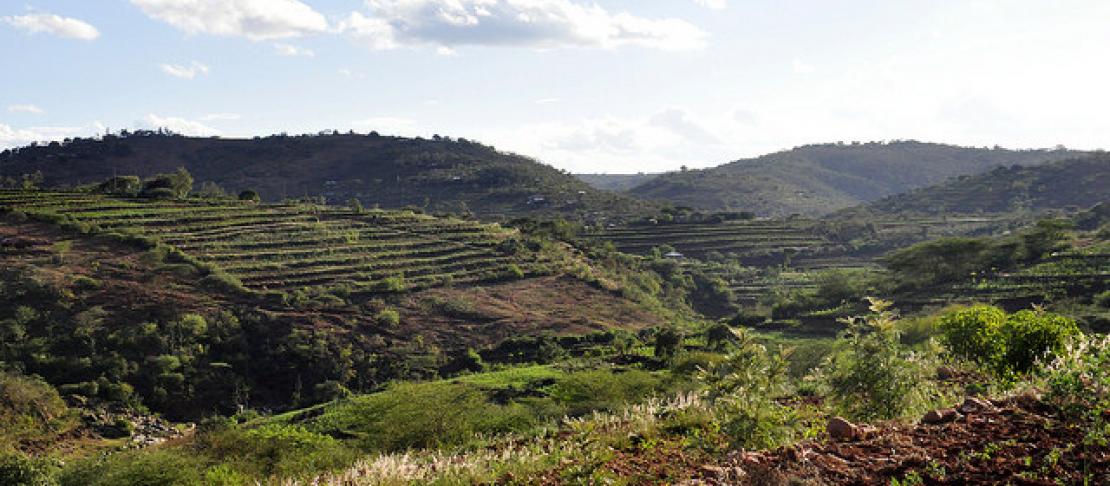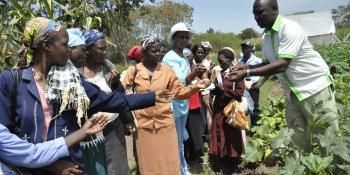Unpacking climate-smart agriculture for upscaling in East Africa

Despite its inception in 2010, climate-smart agriculture is yet to gain buy-in from stakeholders in Africa and beyond.
On 1 December 2017, the CGIAR Research Program on Climate Change, Agriculture and Food Security (CCAFS) facilitated a session on "Upscaling CSA through multi-stakeholder participation" during the conference on “Research & Policy: two peas in a pod? A dialogue for food security impact” organized by the Netherlands Organisation for Scientific Research (NWO-WOTRO) and the Food and Business Knowledge Platform (F&BKP) in collaboration with the Dutch Ministries of Foreign Affairs and Agriculture, Nature and Food Quality. The conference brought together around 150 participants from the Netherlands, Africa and South Asia.
Read more about the conference: Research & Policy: two peas in a pod? A dialogue for food security impact
What is different about climate-smart agriculture?
During the session facilitated by CCAFS, it emerged that the climate-smart agriculture (CSA) concept still needs to be demystified and unpacked for stakeholders including policymakers who are required to create an enabling environment to support uptake and upscaling of CSA technologies and practices. Climate change and variability will have a great impact on food security and nutrition and livelihoods in East Africa, and CSA offers unique opportunities to meet the multiple objectives of improving food and nutrition security, enhance adaptation to climate change and reduce greenhouse gas (GHG) emissions at local scales.
In his opening presentation, Dr. Dawit Solomon, CCAFS East Africa Program Leader, emphasized that CSA is different from other approaches as it has an explicit consideration of climatic risks that are happening more rapidly and with greater intensity than in the past. He also acknowledged that there are growing concerns that the term is being used to green-wash practices that are, in fact, damaging for the climate and for farming.
See Dawit Solomon's presentation: Climate-Smart Agriculture (CSA): What is it? Why is it needed?
He pointed out that there are new investment opportunities for agriculture. By explicitly focusing on climate change, CSA opens up new financing opportunities for agricultural development, by allowing the sector to tap into climate finance for adaptation and mitigation.
Emerging opportunities to support upscaling of climate-smart agriculture
The recently concluded 23rd session of the Conference of the Parties (COP23) to the UN Convention on Climate Change (UNFCCC) held in Bonn marks a milestone for negotiations on agriculture. A key feature of the decision is that while so far negotiations have remained in the technical body of the UNFCCC (SBSTA), the COP has now asked SBSTA and the UNFCCC’s implementation body (Subsidiary Body for Implementation – SBI) to jointly address issues related to agriculture through the Koronivia Joint Work on Agriculture. This will bring greater focus on implementing climate actions in agriculture as opposed to negotiations focused on scientific and technical aspects only. The momentous decision on agriculture at COP23 opens the door to bold and transformative action to make farmers’ livelihoods and food supply more resilient.
Read the CCAFS blog story: A step forward for agriculture at the UN climate talks – Koronivia Joint Work on Agriculture
During the ‘world café’ session facilitated by Sophia Huyer, Gender and Social Inclusion Research Leader at CCAFS, participants highlighted some of the opportunities and enabling factors that can support the upscaling of CSA in East Africa:
- Exploring the role of insurance in addressing climate risks amongst small holder farmers;
- Integrating innovative financing mechanisms including blending climate finance into development planning;
- Identifying entry points for private sector investments;
- Undertaking education and awareness raising on CSA; and
- Building entrepreneurial and agri-business skills, especially among the youth.
How can researchers support governments and practitioners to identify effective and efficient #csa options to address #ClimateChange impacts in #EastAfrica? #fooddialogue @cana_africa @cgiarclimate_EA @WOTRO @foodplatform stay tuned for the recommendations. pic.twitter.com/BHAoWP4i85
— Catherine Mungai (@catmungai) 2017. december 1.
New projects on upscaling climate-smart agriculture approaches in East Africa
With support from the Dutch government, through a collaboration between CCAFS and the Food and Business Global Challenges Program (GCP), new projects have been commissioned to promote scaling up of CSA in East Africa beginning 2018. During the session, the different GCP projects were presented and include:
- Citizen’s Science approach to climate smart and nutrition sensitive seed value chains for food and nutrition security in Uganda and Ethiopia - Silvia Sarapura of the Royal Tropical Institute;
- Upscaling CSA with small-scale food producers organised via Village Savings and Loan Associations (VSLAs): Financing for adoption, behavioural change and resilience in rural Iringa Region, Tanzania - Ruerd Ruben of Wageningen University and Research;
- Inclusive and climate smart business models in Ethiopian and Kenyan dairy value chains - Rik Eweg of Van Hall Larenstein, University of Applied Sciences University;
- Understanding and improving scaling readiness of climate smart, nutrient management decision support tools (DST) in different institutional environments: Ethiopia & Tanzania - Cees Leeuwis of Wageningen University and Research;
- Understanding and scaling Organizations for SMAllholder Resilience - Domenico Dentoni of Wageningen University and Research;
- Using Climate-Smart Financial Diaries for Scaling in the Nyando Basin, Kenya - Lia van Wesenbeeck of The Vrije Universiteit Amsterdam;
- Promoting climate resilient seed varieties: Smallholder barriers to adoption and willingness to pay for seed of drought tolerant maize varieties in Uganda - Astrid Mastenbroek of Wageningen University and Research.
Next steps
Policymakers need to meet their obligations under the Paris Agreement including the Nationally Determined Contribution (NDCs), and CSA is an approach that can be used to achieve this. However, policies tend to be generic and long lasting while research is very specific. Therefore, there is a need for policymakers and researchers to work together. The new GCP projects and the ongoing CCAFS initiatives in the Climate-Smart Villages in East Africa will create conducive learning grounds for researchers, policymakers and other stakeholders to collaborate with farming communities and other players along the agricultural value chain to identify how CSA can be upscaled in East Africa.
On 6 and 7 February 2018, the GCP projects will be officially launched in Arusha, Tanzania. The projects are expected to achieve impact on the objective of the Global Challenges Programme (GCP) which is to promote research-based advanced understanding of emerging key issues in global and regional food security and their impact on local food security, and the role of private sector development. The kick-off meeting is the start of a collaboration between CCAFS, NWO-WOTRO and F&BKP. A key focus of this collaboration is on impact, and how to realize the involvement of target groups and the back flowing of results into society, in particular policy and practice.
More information:
- Video: Research & policy: two peas in a pod? Interview with Dawit Solomon
- Conference concept note: Theme 7 – Climate Smart Agriculture in East Africa
- Background paper: Climate-smart agriculture (CSA) for resilient agriculture, food security and inclusive business growth in East Africa
Catherine Mungai is the Partnership and Policy specialist (CCAFS EA), Maren Radeny is the Science Officer (CCAFS EA) and Dawit Solomon is the Regional Program Leader (CCAFS EA).



